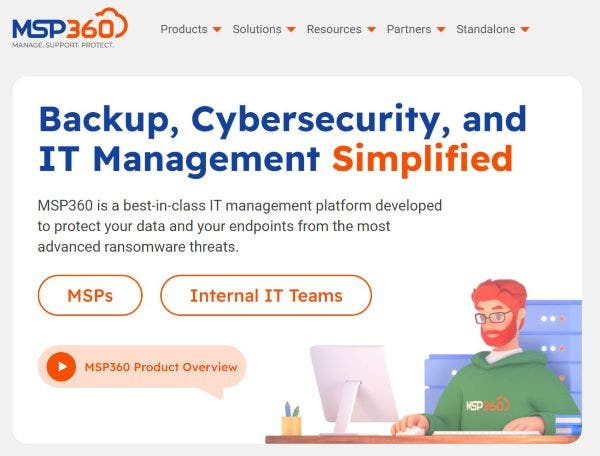MSP360: We Want To Be The ‘No. 1 MSP Platform On The Planet’
‘When I joined in 2019, anybody could come and buy. [Later, we wanted customers] to either buy from an MSP or an other channel partner rather than coming direct to us. So we went through a price increase on all [direct] sales. We actually doubled the price over the MSP price, and said, “[If] you don’t want to pay double, then go buy from an MSP,”’ says MSP360 CEO Brian Helwig.

MSP360 CEO Brian Helwig
Full Pivot To The Channel
IT management platform provider MSP360 really wants to show it is serious about working with the channel. The company has in the last couple of years significantly raised the price it charged direct customers of its IT management software, and has recently told new customers they can only purchase its software from its MSP or reseller partners.
It is a move that has worked, according to MSP360 CEO Brian Helwig.
“[We work with] about 10,000 MSPs worldwide,” Helwig told CRN. “We have about 3,800 businesses who are buying our products from the channel. And we have about 1.8 million endpoints globally under management in some form or fashion, whether it be our stand-alone product or our managed product.”
[Related: NinjaOne’s New Channel Chief On Plans For Partner Program Relaunch]
The pivot to the channel is a part of MSP360’s move to be a bigger part of the IT management business, and indeed part of its move towards the lofty goal of being the largest MSP-focused IT management platform, Helwig said.
“And that’s our goal,” he said. “Manage, scale, and protect all your IT infrastructure. So that’s endpoint management, from a proactive perspective, from patch management, security, anti-virus, all that kind of stuff, all the way through to the backup space and data protection side. And then we interoperating all the way between.”
Along the way, MSP360 is bulking up on its data protect, RMM (remote monitoring and management), and especially its cybersecurity capabilities, both in terms of the third-party tools that integrate with its platform and protecting its own platform, Helwig said.
“We do our own internal audits,” he said. “We use different tools to make sure that our code doesn’t have a backdoor, that we’re at our best when it comes to penetration testing, and we make sure that the solutions that we offer follow best-in-class security best practices.”
MSP360 is still far from being the largest MSP-focused IT management platform. But the changes the company is implementing are helping it along towards that goal. To better understanding what is going on at MSP360, click through the slideshow.

How do you define MSP360?
The No. 1 IT management platform. And that’s our goal. Manage, scale, and protect all your IT infrastructure. So that’s endpoint management, from a proactive perspective, from patch management, security, anti-virus, all that kind of stuff, all the way through to the backup space and data protection side. And then we interoperating all the way between.
The vision of MSP360 was to be the No. 1 MSP platform on the planet. And everybody was like, ‘Oh, cool. What’s that mean?’ And I said, ‘Well, it means every tool set you need to be able to manage and protect your infrastructure, all in one ecosystem [including] cyber storage and how we’re doing things with AWS and Wasabi, how we handle our backups, and our interconnectivity platform which allows people to connect and support their customers whether they’re managed service providers or internal IT teams.
Last but not least, we’ve done a full pivot to the channel this year, where you’re only able to purchase our software from the channel. You’re no longer able to purchase direct from us anymore.

CRN loves hearing that. What caused MSP360 to change its approach to the business? Why 100 percent channel?
When I joined in 2019, anybody could come and buy. We were mostly focused on MSPs, but businesses were coming and buying [direct]. In late 2020, as we got our CRM implemented with good customer profiles, we started looking at making sure that we’re catering MSPs first, and if businesses wanted to buy, we’d want them to either buy from an MSP or an other channel partner rather than coming direct to us. So we went through a price increase on all [direct] sales. We actually doubled the price over the MSP price, and said, ‘[If] you don’t want to pay double, then go buy from an MSP.’ [In late 2022, we told them], ‘We love to have you as a business customer and we’d like to continue to have you as a business customer. In order to do that, you have to buy from one of our authorized resellers.’ So we’re using [Tempe, Ariz.-based] iT1, [Scottsdale, Ariz.-based] GHA Technologies, and [West Covina, Calif.-based] Keeter Technical Service as our main three. We also do business through Toronto-based Softchoice, [Milwaukee, Wisc.-based] SoftwareOne, [Somerset, N.J.-based] SHI, and all the bigger guys. And now businesses have to buy from one of those platforms. …
[iT1, GSA, and Keeter] have become strategic partners of ours. They’ve been very big proponents of ours in the channel.
Why would businesses want to buy your platform for their own use rather than working directly with a managed service provider?
Well, some of these are pretty large enterprises, and they have their own internal IT teams. And just like they use things like Kaseya and ConnectWise, they found that we were a great solution for them. We cooperate quite well with Veeam and Datto, and we allow for all those ancillary endpoints to be able to be merged and stuffed into one single data repository, and give them the ability to manage it. We give them an RMM that they can do basic compliance with. And we also completely integrate Deep Instinct which gives them a whole new level of ransomware protection.
You mentioned partnering with Datto. How has that partnership been going now that Datto was acquired by Kaseya?
No change for us. We still are in a large amount of Datto implementations. We still sell their appliances. We still help them replicate, we still help them push to their cloud and all the other ancillary devices that sit out there. So it’s really been no big change for us. In fact, if anything, we’ve seen more customers come to us looking for alternatives and being able to leverage MSP360 more either because of the way that the acquisition has happened and how they feel about it, or because they’re looking for more cost effective solutions that meet their budget needs.

With all the concerns about ransomware, what is MSP360 doing to protect its MSPs and their customers?
We do two things. First and foremost, we use object locking for our backups with Wasabi and AWS. This basically locks a piece of data and prevents it from being manipulated in any way shape, or form until a time lock expires. On the endpoint management side, outside of making sure fundamental best practices are in place for anti-virus, firewalls, Windows Security, patches, and others, we’ve partnered with Deep Instinct which takes endpoint protection to a new level, sort of like the next level of EPP (endpoint protection platform) or EDR (endpoint detection and response). What I love about this partnership is, Deep Instinct is fully focused on endpoint detection and response. That’s their main bread and butter. And we felt like partnering with them with their deep learning technology. And the fact that they have a 99.9 percent efficacy rate, if we’re able to offer that level of protection for the same price point as a Webroot or Microsoft Windows Defender, [partners get] a third-party that’s evaluating not only our products and solutions, but it keeps everybody honest. You don’t have to worry about the same vendor doing security, RMM, and data backups. It’s, my RMM and my data backups are protected by a third-party storage provider, that third-party storage provider is working Wasabi and AWS. And then you have Deep Instinct watching everything overall to make sure you’re not missing out or accidentally ‘protecting’ malware, for lack of a better word, and staying ahead of it. Their zero-day detection rate is just insane. So we felt like that was a really good partnership that allows our MSPs to have the best of both worlds. They’re able to leverage best-in-class storage, best-in-class software, and best-in-class endpoint detection and response.
What else is MSP360 doing on the cybersecurity side?
We do our own internal audits. We use different tools to make sure that our code doesn’t have a backdoor, that we’re at our best when it comes to penetration testing, and we make sure that the solutions that we offer follow best-in-class security best practices. Prevention starts at the build process and at the penetration testing process, and making sure that everything we can do to be proactive and be preventative, we do. And on top of that, we layer on technologies like immutable storage and endpoint protection and endpoint detection and response to malware from getting in. And then if it does, the immutable storage prevents data from being overwritten. We think that’s a pretty solid story, a pretty good way for us to offer, whether to a business or an MSP offering services, confidence in not only the solutions that we offer, but the ecosystem we provide for some of our third-party partners to be able to offer their solutions as well.
We’ve talked about data protection and security. What is changing about MSP360’s RMM capabilities?
Well, we’ve introduced Mac and Linux in our RMM. We’ve always had Windows. We have all the security patches. We’re doing pretty much everything now except for third-party patch management. We’re starting to evaluate what that’s going to look like, probably in the latter half of 2023 or early 2024. We’re meeting a pretty good response with our RMM as a whole. From the pricing perspective, it’s about $60 per admin per month for the MSP. For the business user, the MSRP is around $120 per month per admin. Our MSP360 Connect platform, which competes with Splashtop, comes free in both the backup world as well as the RMM, and comes with our both on-prem and web-based Connect products. So that’s all available to our customers and our MSPs. VARs and MSPs get the best price, channel gets the second-best price, you of course the business is the one who’s buying from the channel.

MSP360 hasn’t done much in terms of acquisitions, right?
No, actually. We’ve built all of our own products from the ground up. I haven’t really had a lot of interest in doing any kind of acquisitions. We’ve stayed primarily focused on our target market, which is MSPs at about 10,000 endpoints and below. Our largest MSP is running around 60,000 endpoints. Our smallest MSP is running five endpoints. You can start as small as five, but our target market is 10,000 and below.
How many MSPs is MSP360 working with right now?
About 10,000 MSPs worldwide. We have about 3,800 businesses who are buying our products from the channel. And we have about 1.8 million endpoints globally under management in some form or fashion, whether it be our stand-alone product or our managed product.
What else we need to know about MSP360?
We’re the coolest thing right now. We’re the only guys that haven’t been bought.
At our price point, we’re still the most cost-effective in the market. And we start to hear things like it just works, it’s dependable. Our G2.com reviews are starting to really speak for themselves. We’re maturing. And as we mature, our services are maturing. Our support organization is 24x7x365. We have a premium support model. We have a standard support model now. We have a services organization that’s starting help MSPs and businesses implement MSP360 if they need it. We of course are using the channel to make that happen. We’ve just enabled about 250 new channel sales reps this year alone, between December and January. So we’re pretty excited about our partnerships.
You just said that you’re the only company in this space that hasn’t been acquired by a competitor or a private equity firm, right?
That’s right. We’re completely bootstrapped. We take a lot of pride in our products, in our customer service, in the way in which we deliver our services.
But given the fact that all the other competitors in this space are private equity-backed, isn’t there a disadvantage in not having some deep pockets behind you if you need it?
So far, no. It’s not like that we’re not cashflow positive. We’ve been profitable all the time. We manage our business well. And at the end of the day, if we felt we needed to raise capital, we would. But our marketing budget is great. Our events are getting bigger. Our presence is becoming more prominent. People tell us all the time, ‘Wow, you guys have really grown. We remember when you were just a 6x8 [foot] booth in the corner, and now you’re doing a 20x20 [foot booth] at the ConnectWise or Kaseya events.’ And it’s because our customers love us. So we want to continue to go after the market and stay at that 10,000 endpoints and below and focus on that area.
We’ve been bootstrapped since 2011. And never taken on any debt. And I’ve been able to put money in the bank and continue to be a presence in the market. And we’re going to continue to be a formidable presence in the market.